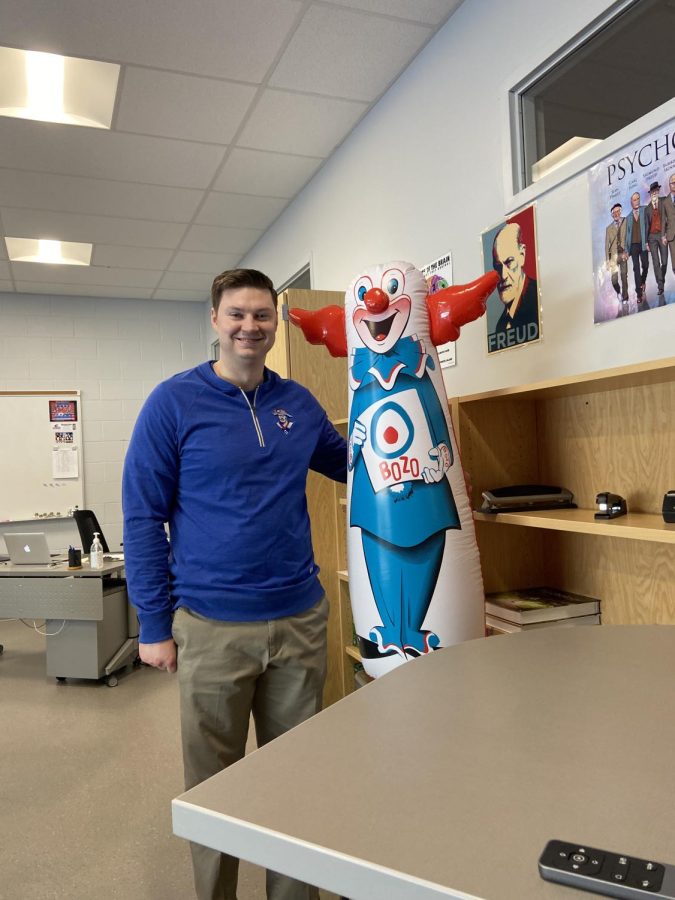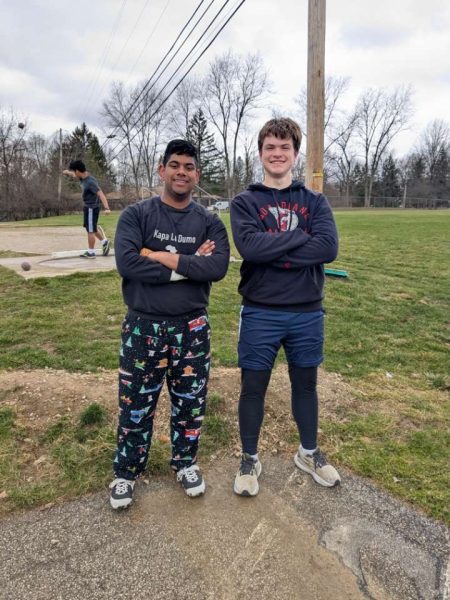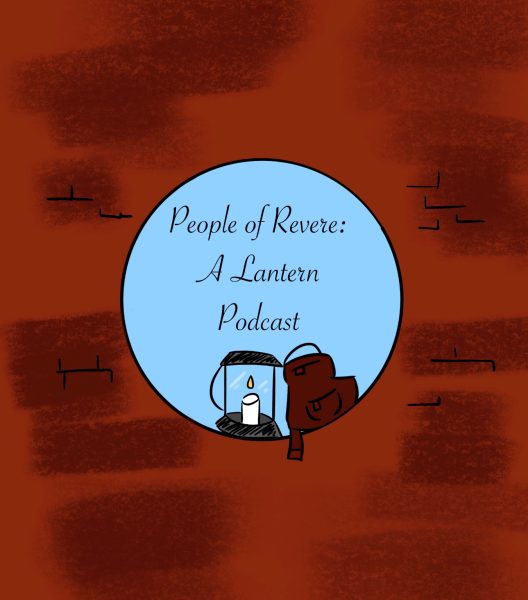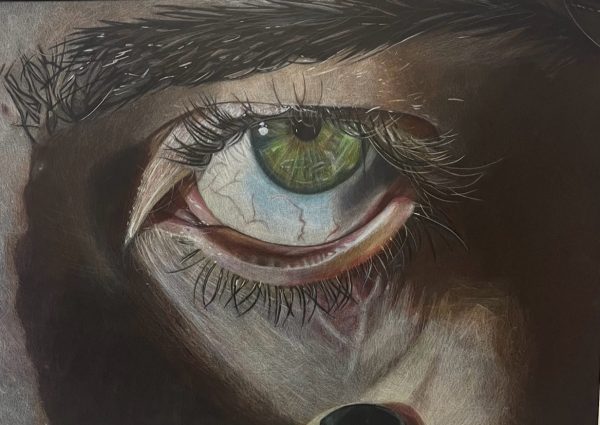Revere teacher creates inviting environment for students
Browne poses with Bozo.
Walking into room C101, students can see a variety of posters plastered on the wall. On the back wall, next to an inflatable Bozo the clown, there are multiple band posters including Depeche Mode, Fleetwood Mac, U2 and Bruce Springsteen. On the other side are framed pictures of Rorschach inkblot tests which help psychologists to analyze a patient’s personality based on what they interpret the ink to be. Finally, posters of psychologists and sociologists like Sigmund Freud near the door give an idea of who students will learn about in the curriculum taught in room C101.
Eric Browne teaches Sociology, AP Psychology and Psychology at Revere High School, teaching all the subjects that he has always been passionate about.
Browne began college as a broadcast journalism major but felt that the career would not suit him in the future, so he eventually began an integrated social studies education major that would better fit his interests.
“I had always had a pretty high level of interest in history, government, psychology and just those subjects,” Browne said.
Along with teaching these subjects, Browne also coaches baseball. He began coaching during his freshman and sophomore years of college and has kept coaching baseball at Revere while teaching. Being able to incorporate both of his interest in psychology and baseball in his career helped him choose where he works today.
“I’ve always considered teaching, and with the possibility of teaching and coaching baseball, it looked good and appealed to me,” Browne said.
His first teaching job after years of being a substitute teacher at various schools was at Revere. Initially, he substitute taught at Revere and other districts in Summit before teaching Psychology and Sociology at Revere.
“This is my fourth year. [I’ve had] Psychology and AP Psychology [since] my first year, but I didn’t have sociology until year two,” Browne said.
While he enjoys teaching both subjects and has nearly the same amount of years teaching both of them, Browne prefers psychology over sociology.
“I probably like psychology [better]. I just think the students like it more. There’s a lot of inserting things, in psychology you have the dynamic people you study. The psychologists themselves are pretty interesting and in turn, that makes the course [more interesting],” Browne said.
Browne teaches about popular psychologists like Sigmund Freud, Alfred Bandura and B. F. Skinner in his course with each of their unique takes on psychological processes. Because the content itself is fascinating, sometimes the challenges lie in how the teacher can impart this knowledge on their students.
“I would say the most difficult thing about [teaching] is just reaching as many students as you can. [It’s trying to communicate that] what you are instructing them to do and [that it] is relevant and it’s going to matter that they know this material,” Browne said.
Browne finds it challenging to let his students know that a class is worth their time, effort, energy and engagement. As a teacher in general, it is hard to compete for a student’s attention while the class is not on the forefront of their mind.
“Students are very busy. Obviously there’s other classes, there’s after school activities and then there’s the social life,” Browne said.
Despite the challenges, once the student commits to learning and growing, it makes the job worthwhile.
“It’s fun [when] you see growth, and I enjoy when students are growing academically but also socially and personally. It can be a challenge to just convince students that are hesitant and overwhelmed or haven’t had success in the past. As a teacher and as a coach, you just want to get the best out of a student or player,” Browne said.
To combat the difficulties of teaching, Browne often reflects on his experiences and adapts so that he is prepared for what the future may hold.
“Reflection is a big tool to use as a professional teacher. I try to stay consistent. I believe in a routine and I’m structured, but you have to [also] balance trying new things and taking risks,” Browne said.
A risk that Browne has taken recently is creating an Instagram account for his AP Psychology class. While this action was outside of what he is used to, he believes it can benefit his class and begin to solve the problem with teachers engaging with their students.
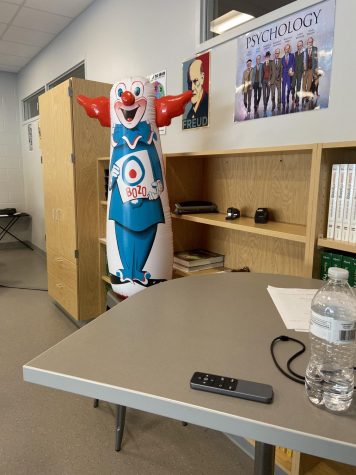
“Again, it’s just going outside of my comfort zone a little bit, and I’ve had Twitter since I started here and just realized that most of my students are on Instagram. I think it was just a way to maybe connect with students and since people are there quite a bit, maybe use what we’re studying, really fascinating things, and really to showcase work as well,” Browne said.
Browne describes the origin of posting his student’s work on the @revere_psych Instagram account.
“I think it started with the movie presentations and just having four classes, not everybody sees everybody’s work. So, just in a way to create buzz, in a way to just connect, hopefully,” Browne said.
Browne plans his posting time strategically to get students thinking.
“I like to put something on a Sunday night to just get people thinking, maybe remind them about things coming up, or just have a laugh. I like to balance things with comedy when possible,” Browne said.
Browne describes his long-term goals for the account.
“Hopefully, it also connects students that took the course a few years ago and try to have a little alumni connection there. That would be really great if a sophomore or junior at Cincinnati or Ohio State was at Revere and maybe they’re pursuing Psychology and they say, ‘Yeah, we talked about BF Skinner today, or Albert Bandera.’ That would be ideal,” Browne said.
Browne describes his thought process behind possibly branching out into different social media platforms.
“Hopefully, it’s positive and it’s not just me. It’s my account, but hopefully more folks will be engaged. We’ll see if it’s a temporary thing that runs its course, maybe some other platform will be [more popular] a couple of years from now. I don’t know if I can pull off the TikTok, but we’ll see,” Browne said.
On Twitter, Browne maintains a different social media presence than on Instagram.
“I recognize that Twitter is just me liking or retweeting. I will usually like Revere stuff, Revere sports, just some baseball coaches, just some inspirational stuff. I try to avoid politics, but some news things I think are interesting I’ll like or retweet,” Browne said.
Browne considers all sides to posting on a social media platform.
“I do think about that stuff, ‘am I increasing the use of a product that’s been documented that it can manipulate young people and do some harm?’ I am aware of that, but I don’t think it’s time to just throw all of the social media away, because there is some good. Because it matters a lot. Having work posted there or just being recognized, matters to a lot of people,” Browne said.
Before every period, Browne’s playlist—Mr. Browne’s Hits—greets students as they walk in.
“[I’ve had] this Spotify account for probably seven to eight years and it’s just grown and I just upgraded to Premium. Part of it for me is that I play my music. My first year, I let my classes [make] a class playlist, but it turned out to be everybody complaining about everybody’s songs. And now people [go], ‘Oh yeah, this is Browne’s music,’ so they don’t complain,” Browne said.
Browne describes the rationale behind his playlist.
“It’s kind of for me to get through the day and you know what, I haven’t had a lot of complaints. A lot of people will recognize the songs, and it’s a public list, you’re welcome to share and follow Mr. Browne’s Hits. It’s probably like five or six playlists in one, [I] keep it [on] one so it scrambles,” Browne said.
Mr. Browne’s Hits spans a wide variety of genres.
“There are certain genres: there’s Rock, there’s Pop, there’s New Wave, and then there’s some Motown in there. There’s 90s Pop-rock, there are ones from the 2010s, Coldplay, stuff like that,” Browne said.
Browne also spends time with the other faculty in the social studies department outside of school hours. Browne describes an outing with some other members of the social studies department.
“I went bowling once with Mr. Fry, Mr. Milczeski, and Mr. Cooper, who’s now retired. I either finished last or second to last. I don’t want to say never again, but it’s more of a social thing. Maybe one day I’ll really get into it but I have the highest velocity down the lane but the lowest amount of pins. It’s not something I’m naturally skilled at,” Browne said.
Similar outings to the bowling outing occur with limited frequency.
“[The social studies department] mentions that ‘We’ve got to have a department outing,’ but it seems like it never happens. I think it’s just a family schedule. Everybody except me is married with kids and has lots of things going on. I’m coaching too. We spend a lot of time together here, so maybe in the summer, [if] we miss each other, we’ll do something,” Browne said.
Browne looks forward to the future of his classes.
“I’m excited about the AP Psych program; it seems to be doing well, [it’s getting] a lot of interest, and I hope my classes add value to folks’ lives. [I hope] they get some good things out of it, good memories too,” Browne said.
Kim Gerdes, a 6th grade English teacher at RMS and Browne’s mother, became a teacher in 1994.
“I waited until Eric was about seven. I hope I [influenced him to pursue teaching]. I think so,” Gerdes said.
Gerdes describes Browne’s interests as a high school student.
“He liked writing and history. He always took advanced history courses, and he loves politics,” Gerdes said.
One of Browne’s early hobbies was baseball, which he continues to coach to this day.
“He loved baseball, he’s been playing it since he’s probably been four, and as he went through school, he was always on a baseball team. He started off as a pitcher, and then with so much repetition on the elbow, he had to stop that,” Gerdes said.
Gerdes describes Browne’s personality while growing up.
“He was always very funny, yet serious. He took play very seriously. He does good impersonations of politicians, and even when he was younger he could copy voices. Very creative. He was a very good kid but definitely hard-headed at times, too,” Gerdes said.
While growing up, many children attach themselves to a particular character. For Browne, this character was Batman.
“When he was a kid, he loved to play Batman. When he was really little, eight or nine, he always dressed up. He had this Batman outfit, and he had one as Robin. The funny thing is, whenever his friends would come over and play, they never got to be Batman. He always had to be Batman. They always had to be the Robin or the sidekick characters,” Gerdes said.
At first, Gerdes thought that Browne would become a sportscaster, but plans changed.
“You know how things change, and there are overcrowded occupations, and he really loves politics and history, so I encouraged him to maybe think about [teaching] because he could always sub if jobs were tight, and that’s exactly what he did,” Gerdes said.
Gerdes describes Browne’s career path.
“He subbed and coached, and then he got hired at Revere. He did a long-term sub in the social studies department, and then he got the job when that teacher retired. His allegiance has always been to Revere. Of course, I encouraged that,” Gerdes said.
Browne graduated from Kent State Summa Cum Laude.
“He did great. A lot of people don’t know this, but he was a reporter on the Kent television station, the KSU TV station, so he kind of went a little bit into the journalism idea, and he was a TV anchor reporter in the entertainment part of it,” Gerdes said.
Gerdes describes Browne as a son.
“He’s just been a terrific son. He really has been from day one. He’s just mature, but he can act like a three-year-old, and he’s given me a lot of material to share with my students over the years about how funny he was as a kid,” Gerdes said.
Gerdes often uses anecdotes from Browne’s childhood as examples for vocabulary words for her class.
“You take the word malingerer, which means someone who fakes illnesses so they don’t have to go to school or go to work. That was one of our vocab words one day in 6th grade, so I said: ‘You know, when Eric was about three and a half, maybe four,[. . .] he went to preschool. Fun, simple, no big deal. But he used to tell me at night his throat was going to be sore in the morning. And I said, ‘Well, Eric, is it sore now?’ And he goes, ‘No, it’s going to be sore in the morning, so I’ll stay home and play’,” Gerdes said.
Gerdes summarizes her feelings on Browne over the years.
“I use him [in class] and I have wonderful memories of his childhood, and I’m so proud of him as an adult right now. I’m so proud he’s part of the Revere community,” Gerdes said.
When Revere first hired Browne, department head Jeff Fry already had an impression of him from Browne’s eight years spent substitute teaching at Revere.
“We knew that when we hired him he was going to be consistent. We knew from the beginning that he would be ultra-prepared. He knows what he’s getting done every period. I don’t, but he does. He’s got a very dry wit and sense of humor,” Fry said.
Fry describes Browne’s personality and sense of humor.
“I think we’re lucky to have him and he adds that dry humor and wit, kind of cutting sometimes. You have to be careful, or you might miss it, or he might zing you and you might not even know it. He keeps us on our toes,” Fry said.
Browne’s students often enjoy his sense of humor too. Paige Gehring, Revere senior and student of his fifth period AP Psychology class, joined his class after hearing that her friends enjoyed taking it.
“I heard from [. . .] friends that they really enjoyed the class. They really liked Browne himself, he is a very funny guy, and they had an interest in psychology,” Gehring said.
Browne mentioned the structure and organization he places his class in, that includes various fun projects that Gehring enjoys.
“I love the activities that we do. I really like the projects and honestly he does prepare you well for the tests; he gives lots of study guides and Quizlets,” Gehring said.
Browne is able to organize the essential notes for the class while also giving the students interesting projects to do. Most importantly, Browne cares about the growth of his students.
“Browne wants the best for each of his students. He tries to relate his life to ours and I think it’s really nice [when teachers care about our lives or what we’re doing],” Gehring said.
In each of his classes, Browne creates a fun and inviting environment for his students. Browne believes in the importance of structure while also being willing to adapt and change to the situation. In both coaching and teaching, he cultivates the best version of all those learning under him.

